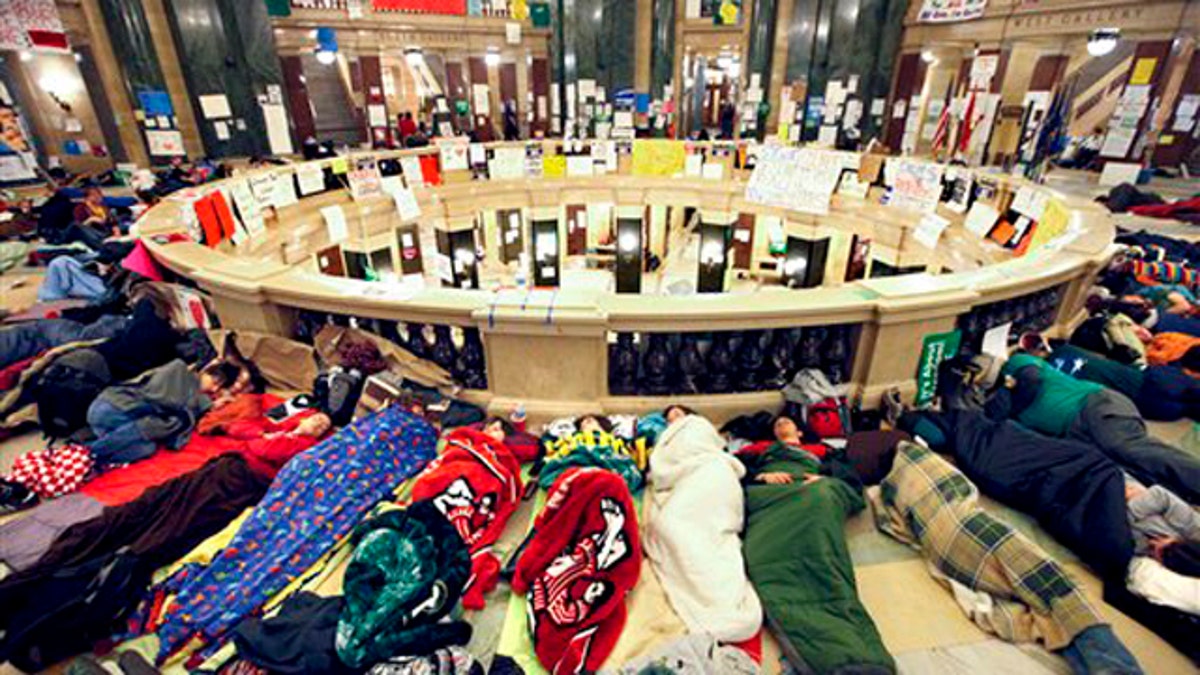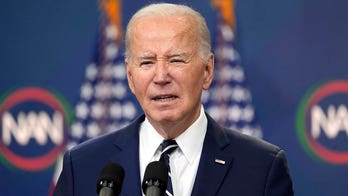
Opponents of Wisconsin Gov. Scott Walker's budget bill sleep in the rotunda of the Wisconsin State Capitol Feb. 22. (AP)
Wisconsin Republicans in the state Assembly charged toward a vote on their controversial budget bill Thursday after compelling Democrats to limit debate, though the Senate remained stuck on account of 14 boycotting lawmakers.
The modest breakthrough on the Assembly side was announced at dawn following more than 42 hours of debate which began Tuesday morning. Under the plan, the Republican majority will allow another 38 amendments to be considered, for no more than 10 minutes apiece. That puts the Assembly on track for a vote perhaps as early as midday.
Though the announcement was pitched as a deal, state Democrats said Republicans were unilaterally bringing the debate to a close. One aide in Minority Leader Peter Barca's office said Republicans gave the Democrats two options: debate 38 additional amendments or end debate immediately.
"We will strongly make our points, but understand you are limiting the voice of the public as you do this," said Democratic state Rep. Mark Pocan of Madison. "You can't dictate democracy. You are limiting the people's voice with this agreement this morning."
Democrats, who are in the minority, don't have the votes to stop the bill once the vote occurs.
The movement on the Assembly side, though, stood in contrast to the situation in the Senate, where 14 Democratic lawmakers were still absent, blocking a vote on Gov. Scott Walker's plan to curb union benefits and collective-bargaining rights.
Senate Majority Leader Scott Fitzgerald's office confirmed to Fox News that state patrol officers had once again been dispatched to the homes of Democratic senators in the hope of persuading them to return. However, one of the 14 absent lawmakers said the caucus is still out of state and will not be swayed by police showing up at their doors. Democratic Sen. Jon Erpenbach said the senators will not be returning Thursday.
Tens of thousands of people have protested the bill for nine straight days, with hundreds spending the night in sleeping bags on the hard marble floor of the Capitol as the debate was broadcast on monitors in the rotunda. Many of them were still sleeping when the deal to only debate 38 more amendments, for no more than 10 minutes each, was announced.
Passage of the bill in the Assembly would be a victory for Republicans and Walker, but the measure must still clear the Senate.
The battle over labor rights has been heating up across the country, as new Republican majorities tackle budget woes in several states. The GOP efforts have sparked huge protests from unions and their supporters and led Democrats in Wisconsin and Indiana to flee their states to block measures.
Republicans in Ohio offered a small concession on Wednesday, saying they would support allowing unionized state workers to collectively bargain on wages -- but not for benefits, sick time, vacation or other conditions. Walker's proposal also would allow most public workers to collectively bargain only for wages.
In Ohio, Republican Senate President Tom Niehaus denied protests have dented the GOP's resolve, saying lawmakers decided to make the change after listening to hours of testimony. He said he still believes the bill's core purpose -- reining in spending by allowing governments more flexibility in dealing with their workers -- is intact.
Senate Democratic Leader Capri Cafaro called the changes "window dressing." She said the entire bill should be scrapped.
Wisconsin Democrats have echoed Cafaro for days, but Walker has refused to waver.
Walker reiterated Wednesday that public workers must make concessions to avoid thousands of government layoffs as the state grapples with a $137 million shortfall in its current budget and a projected $3.6 billion hole in the next two-year budget.
The marathon session in the Assembly was grand political theater, with exhausted lawmakers limping around the chamber, rubbing their eyes and yawning as Wednesday night dragged on.
Around midnight, Rep. Dean Kaufert, R-Neenah, accused Democrats of putting on a show for the protesters. Democrats leapt up and started shouting.
"I'm sorry if democracy is a little inconvenient and you had to stay up two nights in a row," Pocan said. "Is this inconvenient? Hell, yeah! It's inconvenient. But we're going to be heard!"
Ohio's measure sits in a Senate committee. No vote has been scheduled on the plan, but thousands of protesters have gathered at the Statehouse to demonstrate, just as in Wisconsin.
In Indiana, Democrats successfully killed a Republican bill that would have prohibited union membership from being a condition of employment by leaving the state on Tuesday. They remained in Illinois in hopes of derailing other parts of Republican Gov. Mitch Daniels' agenda, including restrictions on teacher collective bargaining.
And in Oklahoma, a Republican-controlled state House committee on Wednesday narrowly approved legislation to repeal collective bargaining rights for municipal workers in that state's 13 largest cities.
The Associated Press contributed to this report.




